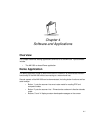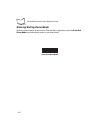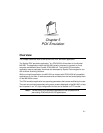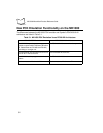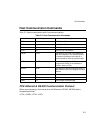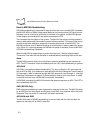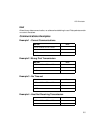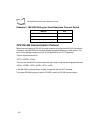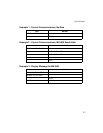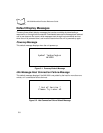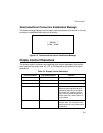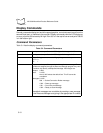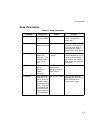
5-4
MK1000 MicroKiosk Product Reference Guide
Host to MK1000 Handshaking
ACK/NAK handshaking is supported for data sent from the host to the MK1000. If enabled,
the MK1000 ACKs or NAKs a data packet based on its format and the LRC being correct.
Because no error checking is performed on the data in the packet, the MK1000 ignores
invalid display commands within the packet and sends an ACK.
This increases the throughput of the system. The MK1000 can store incoming packets in
memory while performing commands in packets already received. This frees up the host to
do other things after sending a sequence of complex commands to the MK1000. The
MK1000 can store up to 25 packets (totaling up to 600 bytes) in memory before the queue
is full. When full, incoming packets are NAKed until space is available (if host to MK1000
ACK/NAK handshaking is enabled).
When the MK1000 is responding to a packet from the host, it waits a programmable
Turnaround Time after the last character is received before transmitting back to the host.
None
The MK1000 transmits data to the host without software handshaking and assumes an
ACK. The EOT character is sent immediately after the LRC. Host handshaking is ignored.
ACK/NAK
ACK/NAK is the default software handshaking. The host verifies the LRC and responds
with an ACK or NAK. If no response is received within the Serial Response Time-out period
(2.0 seconds), a NAK is assumed and the MK1000 retransmits (see Example 4 - Host Not
Receiving Transmission on page 5-5.) Retransmission occurs up to three times. If a NAK
is received from the host, the MK1000 re-transmits immediately.
If ACK/NAK is disabled, the MK1000 transmits the data and assumes an ACK. The EOT is
sent immediately after LRC.
ENQ (RS-232 Only)
ENQ software handshaking is also supported for data sent to the host. The MK1000 waits
for an ENQ from the host before sending data. If the ENQ is not received within the Serial
Response Time-out period (2.0 seconds), the data is discarded.
ACK/NAK with ENQ
The MK1000 uses ACK/NAK handshaking to communicate with the host but does not
respond to the host until an ENQ is received.




